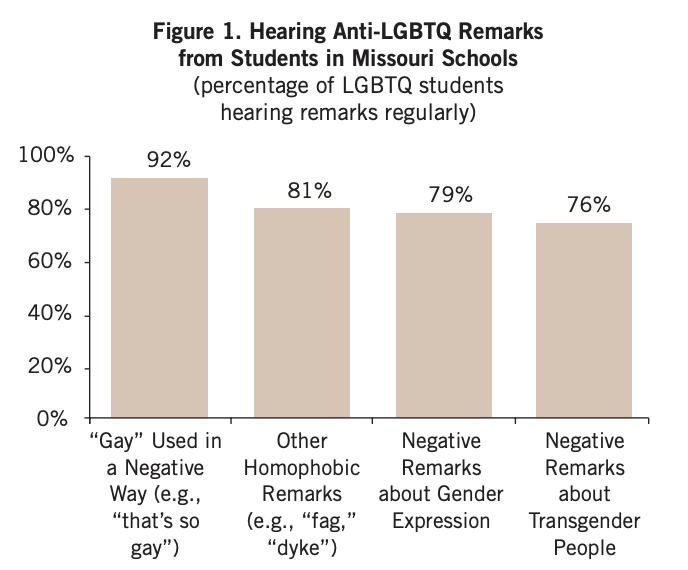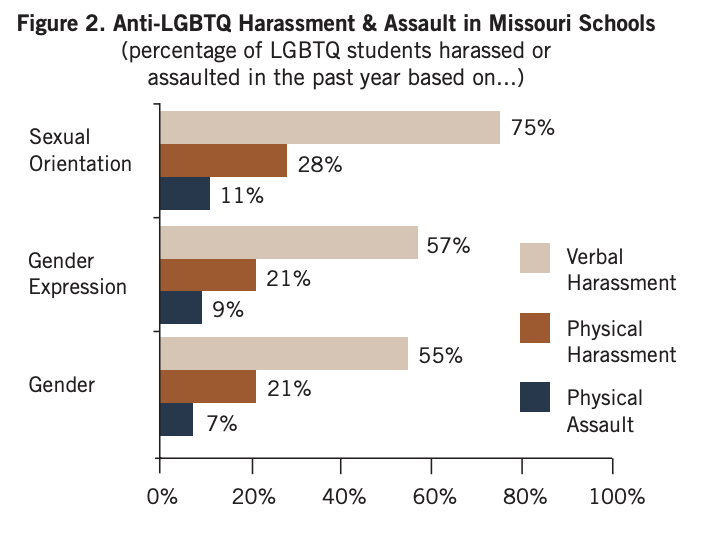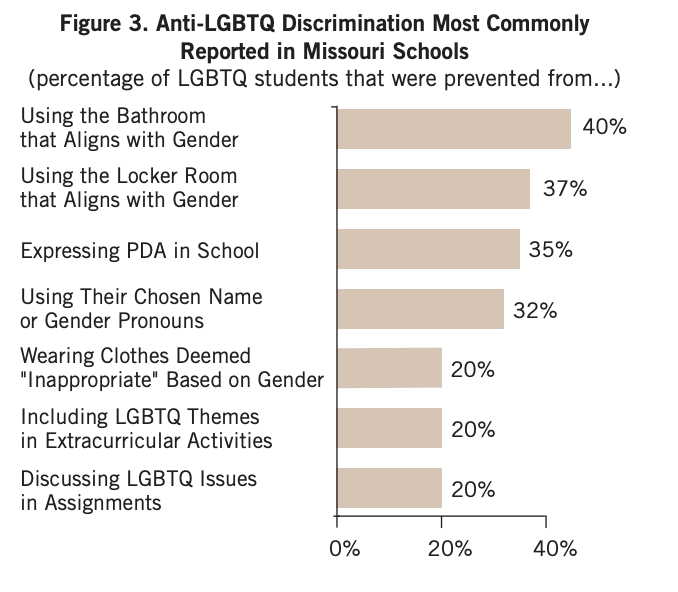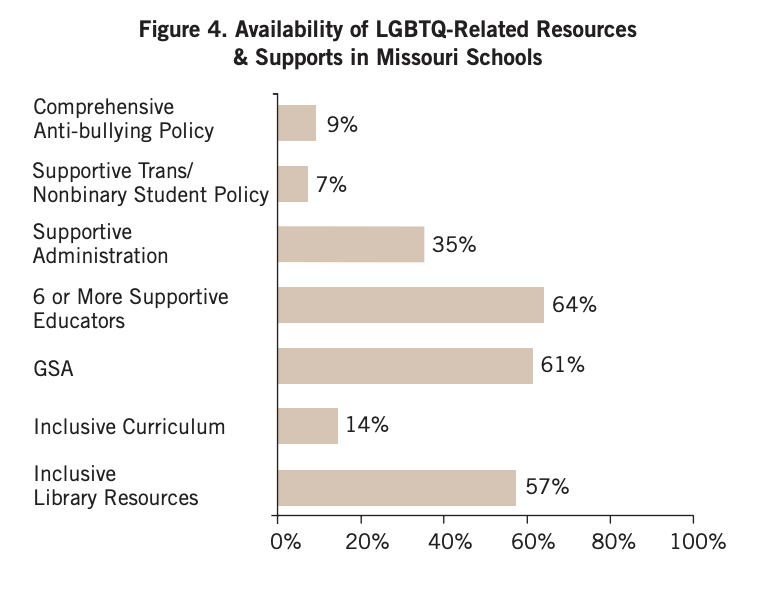Students, Advocates and Counselors Battle Legislation Targeting LGBTQ Rights in Classrooms New bills complicate existing protections for school employees and students. Here is what folks are doing to respond.
Published March 20th, 2023 at 12:59 PM
Above image credit: A group of high schoolers stand together during the demonstration. (Contributed)Merrique Jenson is what she calls a “child of private school environments” in Missouri.
Before her transition, Jenson attended an all-boys Catholic school in the early 2000s. She was kicked out after coming out as gay.
Jenson’s personal experience came to mind as she discussed recent bills like SB 134 in Missouri, which limits school personnel from discussing gender identity and sexual orientation with students and vice versa.
Legislation like this is nothing new.
“Private schools historically have been created to really allow a certain type of morality or values to be instilled, historically,” Jenson said. “Certain ideologies … about what a man is, what a girl is.”
For years Jenson, a Latina trans woman, navigated a school environment that did not welcome or affirm who she was. But when she enrolled in a city magnet school, she was among more diverse students with various backgrounds.
“That really saved my life,” she said. “That, for the first time, allowed me to fully be myself.”
Her experience decades ago rings true for young LGBTQ folks today. But Jenson is most concerned about bill language that may affect the most vulnerable within the demographic—whether it passes or not.
Data from the Gay, Lesbian and Straight Education Network (GLSEN) show that lack of support, whether from school administrators or in classrooms, is harmful to LGBTQ students. Reports by the American Medical Association consistently show that affirming a youth’s identity curbs suicide rates and reduces occurrences of severe depression.
Slideshow: GLSEN’s Findings in Missouri Schools
However, there is a disparity among LGBTQ+ people of color accessing support and care. For trans youth, supports are even more crucial.
Outcomes for trans youth — particularly trans youth of color — who go unsupported include chronic houselessness, being trafficked or, worse, violence and early death.
“There are so many more implications to how this potentially could play out for trans youth of color,” she said. “It makes me so frustrated as somebody who has been an LGBT advocate, you know, for the past 20 plus years.”
Young LGBTQ+ are at higher risk for suicidal ideation, anxiety and depression and bullying. Rates are even higher among LGBTQ+ of color, according to the most recent survey by The Trevor Project.
Missouri Equality Profile by Movement Advancement Project
Scroll down to review state statistics, laws and policies and more.
Medical, educational and psychological experts all agree there is a need for safety and affirmation.
On a local level, folks are stepping up to the plate, like Jenson who is the founder of Transformations.
Her team has planned workshops, support groups and more across Missouri, Kansas and Arkansas. The focus is on empowering the people who need help the most, to fill the gap that could be left by proposed laws.
Students Step Up
Inside classrooms, students are taking note of what is happening in Missouri’s capitol.
Just a few weeks ago, a group of high schoolers took to Kansas City’s streets with rainbow flags and signs in big neon letters that said, “Hug a Queer Day.”
Sylvia Cates wants teachers and her peers to know “it’s okay to say gay.”
That was her message on a heart-shaped cardboard sign, each letter an ombré rainbow.
At just 15 years old, Cates joined the fight against legislation that seeks to bar employees at Missouri public schools from talking about gender identity and sexual orientation with students.
The North Kansas City High School sophomore is an active member of the school’s free speech club. With the help of other members, she organized a protest. She said SB 134 targets LGBTQ+ youth’s ability to speak freely.
“I think taking that away would really affect relationships between teachers and students and even students together,” Cates said.
Gallery: LGBTQ+ Protest
She thought of one “really loved” teacher — *Ms. Z, a gender and sexuality teacher. (Note: The teacher’s name has been changed to protect their identity.)
Her room has a smattering of colorful flags and posters with hotlines for kids to jot down when they need. Even if the bill does not apply to sexual education courses, Cates is unsure what would happen to her class should the bill become law.
“I think the teachers are definitely worried that they’ll have to pick between, like, the legal decision of not talking to students about that, or … risking themselves to support their students, which they shouldn’t have to do,” Cates said.
Part of talking about gender identity and sexual orientation is sexual education, studies show. Without that option, it can become a public health issue and “exacerbates the already serious physical and mental health risks faced by LGBTQ youth,” according to the American Bar Association.
Senate Bill 134, co-sponsored by Missouri Rep. Mike Moon, is titled the “Vulnerable Child Compassion and Protection Act.” The bill bars discussion of gender identity and sexual orientation between public school employees and students in kindergarten through 12th grade.
On Feb. 14, the bill passed Missouri’s Education and Workforce Development Committee 5-4. Now, it goes to the Senate floor for further consideration on March 21.
SB 134 is one of 34 bills in Missouri that target LGBTQ rights, an ACLU report found. Of those, 17 targeted school and education.
Local LGBTQ Rights Leaders and the Filibuster
Grassroots organizations such as PROMO, an LGBTQ+ advocacy and policy center, have been watching legislation like this for a while.
They have been poised to raise concerns about bills that target their community. On March 9, PROMO leaders coordinated a filibuster in response to SB 134.
Katy Erker-Lynch, the organization’s executive director, said what is being considered is “an outing bill.”
“(It) is even more dangerous,” Erker-Lynch said. “This legislation is rooted in this misguided or false belief that indoctrination occurs when students are exposed to LGBTQ-plus identities. … It’s just like, what are we doing?”
The bill’s language also butts up against current federal protections under Title VII of the Civil Rights Act. In 2022, the National Education Association (NEA) issued guidance for public school students and employees in response to legislation like SB 134.
NEA’s guidance for students details examples that the Office for Civil Rights and Educational Opportunities Section of the Civil Rights Division can investigate. One example of a civil rights violation is “outing” a student.
The guide’s example is as follows:
“When he starts middle school, a transgender boy introduces himself as Brayden and tells his classmates he uses he/him pronouns. Some of his former elementary school classmates ‘out’ him to others, and every day during physical education class call him transphobic slurs, push him, and call him by his former name. When he reports it to the school’s administrators, they dismiss it, saying: ‘you can’t expect everyone to agree with your choices.’”
If a student experiences something like that, the guidance suggests telling a teacher or school leader. New local state laws would nullify that protection.
Students can file a formal complaint at any point. They will need to provide receipts or detailed examples of the discriminatory incidents and submit the complaint to the school or school district.
Moon, the sponsor of SB 134, did not return a request for comment. Neither did Lauren Arthur, Missouri state senator for District 17, who criticized the bill’s impact on parental rights during hearings in February.
As it is written, the bill repeatedly discourages staff from “encouraging” their students to “adopt a gender identity or sexual orientation” and “pursue gender reassignment therapy or surgical procedures.”
It is unclear how that will be enforced.
An additional component of the bill requires school personnel to report on student conversations. Staff must tell parents within 24 hours if a student shares any information related to their gender identity, change of pronouns or requests to dress a certain way.
If they do not, employees risk losing their jobs. This is part of the concern for Erker-Lynch.
“When a (LGBTQ-plus) student has just one supportive adult in their life, a student who might be facing some challenge in their life or anybody who has a marginalized identity…, it can be life saving for them,” they said.
Removing a support system can be detrimental.
The impact of similar bills, like that of Florida’s “Don’t Say Gay” bill, has been researched. It affects not only the mental well-being of students, but also the state’s economy.
The Williams Institute’s study from January 2023 found that nearly half of parents considered moving out of state because of the bill.
Erker-Lynch and the PROMO team brought up economic considerations to legislators. Lawmakers did not budge.
“(The bill) will have really serious economic impacts on our state,” Erker-Lynch said. “When decisions are made about where to host things, if we are a state with hate, Missouri will not be selected, right?”
A Former School Counselor’s Take
The other issue is barring discussions of gender identity between student and trained mental health professionals, which the bill identifies as “counselors.”
Students already have limited access to mental health care in a school setting. The most recent tally of school counselor-to-student ratios shows that Missouri lags far behind the American School Counselor Association’s recommended ratio.
Kansas has a counselor-to-student ratio of 396:1, while Missouri’s is 325:1. The American School Counselor Association recommends a ratio of 250-to-1.
Source: American School Counselor Association Survey, 2020-2021
Licensed counselors have raised concerns about these limitations, especially with bill language that claims public school employees “encourage” youth to change pronouns, clothes or names.
Cara Gruhala, a licensed professional counselor, said “encouraging” goes against the American Counseling Association Code of Ethics.
“(The code of ethics does not) support outing individuals of any age without their consent and in essence that’s kind of what the bill is asking for,” Gruhala said. “Also, a big part of our code of ethics says that we cannot impose our values on anyone, so I think there’s some misunderstanding.”
Her job as a health care professional is to identify stressors and provide kids with coping mechanisms to help. She thinks legislators misunderstand the topic of gender identity and what affirming care means for kids like her clients. Gruhala was a school counselor at one point, so she understands the dynamics in a school setting.

Many times, students see counselors for a small percentage of the time while on school grounds. School counselors also have confidentiality clauses, which protect the information a child may share. Counselors work on a case-by-case basis. If they see the need to involve a parent or guardian, they will.
Experts like Gruhala will assess the child, determine safety risks and when or if it would be beneficial to break confidentiality to share information with a parent or guardian.
“Typically, if it is just a question of sexuality or gender, if there are no harmful behaviors along with that, that is not something that I am required to disclose to a parent,” she said.
Mental health care has become increasingly scarce and is needed more these days.
A survey by The Trevor Project found that 86% of trans and non-binary youth experienced worsened mental health with the mere mention and debate of anti-LGBTQ bills.
Kansas and Missouri rank among the worst states for mental health care access.
High school sophomore Cates sees the stress bubbling up and worsening among her own friend group. Middle schoolers and high schoolers are paying attention, she said.
A previous article by Flatland found that to be true, too, when a young trans boy Atticus shared that he is watching state leaders. In 2022, he voiced his concern to Flatland about anti-trans legislation and a desire for teacher support.
Now that possibility might be removed. So, community leaders and advocates are pivoting toward solutions.
These days, counselors, educators, students and advocates are focused on creative, alternative support structures.
Some people like PROMO leader Erker-Lynch are taking their criticisms to the state capitol. Other organizations are building a new network.
Transformations launched a “Liberation Tour, where the organization will host town halls and community events around Arkansas, Kansas and Missouri. Those events will then inform strategies to protect trans youth of color.
Others, like the youth in school classrooms around Missouri, have formed clubs and support groups.
“I don’t think you can really stop advocating for against the awful things going on,” Cates sai
Vicky Diaz-Camacho covers community affairs for Kansas City PBS.
Correction: A previous version of this article misspelled Merrique Jenson’s name. It has been updated.












